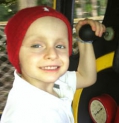An Engineered Nanoimmunotherapy for Treating Neuroblastoma

Background
Neuroblastoma is a common childhood cancer accounting for 15% of cancer-related deaths in children. A majority of neuroblastoma patients are initially diagnosed with metastatic disease. The prognosis for patients within this "high-risk" population is dismal, with overall survival ranging between 30% and 40%. Responding to an urgent need for novel therapies for this disease, we have developed a "nanoimmunotherapy," which combines the advantages of nanoparticles and immunotherapy for treating neuroblastoma. Specifically, we use Prussian blue nanoparticles for photothermal therapy combined with anti-CTLA-4 immune checkpoint inhibition. Photothermal therapy serves as a method to rapidly destroy tumors by heat and, in doing so, breaks up the tumor, which results in a vaccination effect. These effects are complemented by the addition of anti-CTL-4 immune checkpoint inhibition, which elicits robust antitumor responses from the immune system. In earlier studies, we have demonstrated that our nanoimmunotherapy can effectively treat neuroblastoma tumors and confer long-term survival in animal model of the disease. The results are significantly better than those obtained by using the nano- or immunotherapy by itself. Importantly, treated animals are able to reject tumor recurrence indicating that our therapy not only treats neuroblastoma but also confers immunity against recurrence.
Project Goal
In this project, we seek to elucidate the effects of our nanoimmunotherapy on the immune system and understand how these effects can be harnessed to treat neuroblastoma. Successful completion of this project will facilitate further development of nanoimmunotherapy in an animal model of high-risk neuroblastoma and ultimately clinical testing of this possible treatment regimen.
Update: 'A' Award Extension, 2022:
Over the course of the ‘A’ Award, we engineered and tested a novel “nanoimmunotherapy” for treating neuroblastoma. Between completing the ALSF-supported project and initiating clinical trials for patients with neuroblastoma, we will conduct further R&D including the completion of investigational new drug (IND)-enabling toxicological evaluation of our nanoimmunotherapy and navigate the regulatory pathway necessary to file an IND with the US Food and Drug Administration. If successful, our proposed studies will yield a first-in-class thermal nanoparticle-based approach for treating neuroblastoma and will greatly increase the repertoire of immune system-activating therapies available to patients to treat this disease (complementing anti-GD2 monoclonal antibodies and CAR T cell therapies), particularly for patients with high-risk neuroblastoma.

